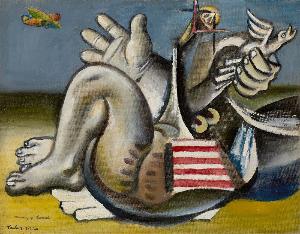Albert Tucker
Albert Tucker
stil: Expressionism;
yer: Oshawa
Doğmuş: 1905
Ölüm: 1995
Biyografi:
Albert Tucker was a Canadian mathematician who made significant contributions to topology, game theory, and non-linear programming. He was born in Oshawa, Ontario, Canada, and earned his B.A. at the University of Toronto in 1928 and his M.A. at the same institution in 1929.
Early Life and Education
Tucker's early life and education played a crucial role in shaping his future. He was born in 1905 and grew up in a family that valued education. After completing his undergraduate degree, Tucker went on to pursue his graduate studies at Princeton University, where he earned his Ph.D. under the supervision of Solomon Lefschetz.
Career
Tucker's career was marked by several notable achievements. He gave the name and interpretation 'prisoner's dilemma' to Merrill M. Flood and Melvin Dresher's model of cooperation and conflict, resulting in one of the most well-known game theoretic paradoxes. He is also known for the Karush-Kuhn-Tucker conditions, a basic result in non-linear programming.
Contributions to Mathematics
Tucker's contributions to mathematics are numerous. He was heavily involved in mathematics education and served as chair of the AP Calculus committee for the College Board from 1960-1963. He also worked with the Committee on the Undergraduate Program in Mathematics (CUPM) of the MAA and was president of the MAA in 1961-1962.
Notable Students
Tucker's Ph.D. students include Michel Balinski, David Gale, Alan J. Goldman, John Isbell, Stephen Maurer, Turing Award winner Marvin Minsky, Nobel Prize winner John Nash, Torrence Parsons, and Nobel Prize winner Lloyd Shapley. Tucker advised and collaborated with Harold W. Kuhn on several papers and mathematical models.
Legacy
Tucker's legacy extends beyond his contributions to mathematics. He was a great source for oral histories of the mathematics community, and his relationships within the field made him a respected figure. Tucker died in 1995 at the age of 89, leaving behind a legacy that continues to inspire mathematicians and artists alike.
- Some of Tucker's notable works can be found on Wikioo.org, including The Prisoner's Dilemma and Karush-Kuhn-Tucker Conditions.
- Tucker's students, such as Marvin Minsky and John Nash, have gone on to make significant contributions to mathematics and computer science.
- Tucker's work can be found in various museums, including the Princeton University Art Museum and the Canadian Museum of History.
works by Tucker can be found on Wikioo.org, including his contributions to topology, game theory, and non-linear programming. His legacy continues to inspire mathematicians and artists alike, making him a notable figure in the history of mathematics.





